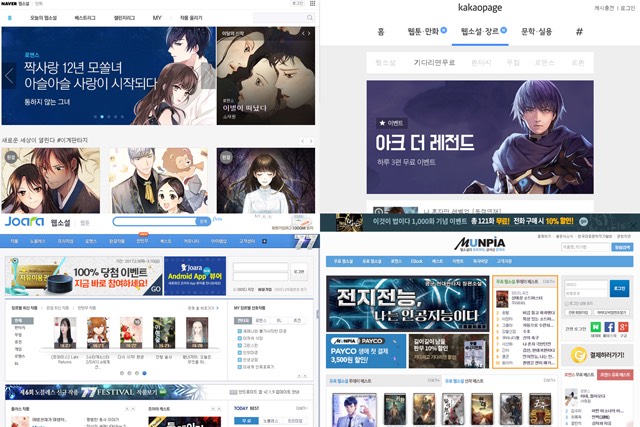Our first in a series on the Korean publishing industry. Brought to you in partnership with Pressian.
Love in the Moonlight (KBS), Sungkyunkwan Scandal (KBS), The First Shop of Coffee Prince (MBC), Moon Lovers: Scarlet Heart Ryo (SBS). What do these popular drama series have in common? They were all based on web novels.
Web novels are now at the center of the fiction industry. Joara, a web fiction site which opened in 2000, has produced an abundance of novels on the strength of its 1.1 million members. Recently, the site has attracted the attention of investors after announcing that it is seeking large scale funding.
Naver, the Korean web portal with the largest number of users, is also making good money with web fiction. With nearly 5 million regular readers, Naver Web Novels is expected to become a separate corporation within the year. I am a Noble Man (written by Siltan), serialized on Joara since 2012, has a total of 7.4 million views, while Naver’s Love in the Moonlight (by Yun I-su) has reached 5.4 million.
The digitalization of fiction is happening outside of Korea as well. Nirvana in Fire, a popular Chinese TV drama series, was based on a web novel of the same title (written by Hai Yan, translated by Jeon Jeong-eun, published by Marshmallow), which also gained a huge following in Korea.
According to the 2016 Story Industry Survey released by the Korea Creative Content Agency, web fiction accounts for the largest percentage (54 percent) of the nation’s ‘story industry’, which consists of animations, broadcasting, advertising, characters, stage performances, and web fiction. KT Economic Management Institute estimated the size of the Korean web fiction market to be about KRW 80 billion. Investors with hundreds of billions of won are currently grappling with the idea of funding various web fiction sites.
We can take a rough guess at why web fiction is achieving substantial growth even in this era of the much discussed crisis of literature. Web fiction has no barrier to entry: since anyone and everyone can write it, the boundary between producers and consumers has been destroyed. Compared to the literary world, which had a high threshold, web fiction is post-authoritarian and mobile friendly. And another important factor is that most web fiction gravitates to popular genres, such as martial arts, fantasy, romance, and adult fiction.
Above all, it is essential to emphasize that web fiction tends to be an exemplary “one-source, multi-use” material, meaning it can be easily transferred and used in different media. The Legendary Moonlight Sculptor (written by Nam Hee-seong), a fantasy novel serialized on Rok Media since 2007 and now Kakao Page was turned into a mobile game, and its rights were sold to 14 countries across the world. It was also turned into a web comic. Twelve web fiction-based mobile games will be released in this year alone.
Pressian‘s ‘The World of Books Beyond The Cover’ series here delves into web fiction, which is changing the landscape of the story industry. This is a summary of the dialogue between Jang Eun-su, the CEO of the Edit Culture Laboratory, and Lee Hong, Executive Editing Director at Hanbit Biz. They thoroughly explore how web fiction was able to grow so quickly, and discuss whether web fiction will exist alongside literary fiction or whether it will absorb literary fiction. Moreover, they summarize the implications of the success of web fiction for print literature.

Major web fiction sites. Clockwise from upper left corner, Never Web Novels, Kakao Page Web Novels, Munpia, and Joara | Pressian
Web fiction differs from print fiction
Web fiction sales have exceeded the sales of traditional print books. Some celebrity writers earn hundreds of millions of won a year or more. In the 17 years since its launch in 2000, Joara, the nation’s largest web fiction platform, has achieved enormous scale, with over 150,000 writers serializing over 460,000 novels and 300,000 readers consuming 8.6 million installments of novels. In 2016, Joara recorded sales of KRW 16.2 billion.
This could be understood as an indicator of the rebirth of popular literature on the internet. Many people have believed that the publishing crisis automatically means the crisis of fiction. However, the popularity of web novels seem to suggest otherwise.
You have worked in the publishing industry for a long time. In your opinion, what are the characteristics of web fiction?
Lee Hong: The ‘story market’ is changing from a ‘have’ market, where people read and own stories, to a ‘use’ market. Unlike print books, web novels can be discarded after they are read. And people can find them anytime to read them again. The story market has fully changed, into a text consumer market.
Prior to the creation of the web fiction market, there was another market where texts were read and discarded. That was the “room” market, consisting of rental shops. A major “room” was manhwabang, or comic room. Many Koreans will remember the kind of books you’d find there—graphic novels as well as romance, martial arts, adult, and corporate novels.
These are genres that major publishing companies in Korea have not considered important in the past. And with the decline of book rental shops, the popularity of such novels waned as well. Yet, despite the changes in generations, the demand for genre novels continued to grow. Also, the environment for videos and characters has grown immensely as well. Under these conditions, novels that were easily consumed and discarded emerged again on the web. So web fiction isn’t something new. It simply means that genres of fiction that already existed and for which there was already demand reappeared in a new environment.
Another important characteristic of web fiction is that writers and readers are essentially the same. Anyone can post on web fiction sites. Writers are free from publishing contracts and the challenges of debuts, it’s easy for them to form direct relationships with readers.
Jang Eun-su: The central axis of stories has already moved to the web platform. Amazon’s Kindle became the mainstream platform for novel consumption. Kindle isn’t simply print books on the internet. In fact, much of the content consumed on Kindle is similar to web novels in Korea.
This kind of change is irreversible. It’s the same as the mainstream medium for music moving from LPs to streaming services. More diverse forms of fiction than we think are changing to fit into the internet environment. Not only web novels, but also audiobooks, and VR stories should also broadly be considered as new forms of stories.
Lee Hong: That’s right. Established writers are well aware of the potential of web fiction sites as platforms to introduce their work. Initially, web fiction became a big topic in literary circles, and many writers used the platform to publish their work.
But it soon died down. From the writers’ perspective, there was a lot that conflicted with their writing habits, and from the readers perspective there was a gap between literary writers and the kind of language, pace, and topics that readers wanted from web fiction. As a result, popular works in the web fiction market tend to be works that were rated “B-level” by literary writers and print literature lovers, or more frankly they were works written by people who are not professional writers. Many web fiction writers write anonymously, using different pen names to write a number of different stories.
How was it possible for unknown writers rather than qualified professional writers to receive more spotlight? Because web fiction’s narrative language and approach to stories are completely different from print books. Above all, the story development method in web fiction differs from that of existing literature. In web fiction, the dramatic structure (exposition, development, climax, and denouement) is not as important. The same is true for style or description of characters’ psychology or mentality.
Web fiction tends to focus on creating appealing characters, fast-paced development, and dialogue. And since web fiction is serialized, most web novels tend to be extremely long. Since the characters have to be appealing, their personalities are dramatically strengthened, and novels with plots that instantly capture readers’ interest become popular. In this environment, people are less likely to read novellas and short fiction that are heavily descriptive or situation-centered.
Earlier, I said that B-level genre fiction tends to be popular on the web. It would be more accurate to say that for fiction to work well on the web, it needs to made in a form that is suited to online consumption. This is one of the reasons why established writers have difficulty competing on the web fiction platform, where anyone can write.

Lovers in the Moonlight, a TV show based on the web novel of the same title. Due to its popularity among the readers, the web novel is currently being developed into various formats, such as a TV show, comic books, and games. | KBS
Web fiction, a reader-centered business
Jang Eun-su: That would be correct to a certain extent. At this point, it would be important for us to consider whether web fiction will supplement print books or replace them. Personally, I don’t believe that they will simply supplement the print book industry.
When you look at the consumers of web fiction overseas, you can see that people who read print books tend to enjoy e-books as well. But the consumption patterns differ. People still consume more serious and heavy content through print books, and ‘snack culture’ content through e-readers.
Naturally, light literature has a wide popular base. People are bound to be attracted to content they can enjoy more conveniently and at lower cost. Ultimately, such consumption patterns will weaken the position of print books. Jumping into the e-book market seems attractive to existing publishers.
Similar movement has been happening in Korea as well. Golden Bough Publishers, which is an imprint of Minumsa Publishing Company dedicated to genre fiction, started open beta testing of their web fiction platform Brit-G on February 1, 2017. Kyobo Books also launched a platform called Tocsoda, targeting web fiction readers, and held a competition for web novelists. There is a rumor that Yes24 plans to enter the light novel market. Regardless of their success or failure, it seems that these companies are responding positively to the changes in the publishing industry.
Lee Hong: Wisdom House is also planning on participating in the web platform market, providing purely educational and cultural content combined with web comics. 21st Century Books is also preparing to enter the web fiction market.
Golden Bough Publishers actually has a specific plan. Existing web fiction tends to be long novels, but Golden Bough hopes to introduce novellas and short fiction. This would differentiate them from other web fiction platforms. I assume that they intend to create a new reader base with a new reading habit, since it would be difficult to steal readers from other web fiction platforms, such as Naver, Kakao Story, Joara, and Munpia. And the genres they are focusing on also seem to be detective and mystery fiction rather than the genres that are popular on other web fiction sites.
Golden Bough must have thought about this a lot, but it is difficult to produce high quality mid-to short-length web fiction, since web novels tend to be centered on fast-paced dialogue. But that doesn’t mean that mid- to short-length fiction are at a complete disadvantage. Ones with smart, tight plots can easily be turned into derivative content. If the initial plot structure is sound, it is likely to be turned into new content, such as games.
We’ll have to wait and see how these publishers participate in the web fiction market, but they have certainly begun to take action. But it will take time to see if they’ll be able to settle down successfully in the web fiction market.
Jang Eun-su: The point where digital fiction industry seeks differentiation is different from the existing print book market. Print books place an emphasis on editors’ values and the writer’s literary world. In contrast, databases are important in the digital fiction industry.
Fundamentally, the web fiction industry is a database industry. The more members a web fiction company has, the more writers and readers it has, and therefore the greater the variety of novels it can produce.
Most print literature readers choose their books based on the writer or their preferred genres. The publisher isn’t as important. But it’s different for web fiction. Joara’s readers will choose to read other novels from Joara; Lezhin Comics readers will select their next work from Lezhin Comics. This means that web fiction is a platform business.
Lee Hong: Many web fiction sites are now looking to attract large-scale capital. Current sales are only about KRW 10 billion, but they are talking about investments of hundreds of billions of won. This is because investors see a much larger potential in the member data that these platforms have. Because of reader data, the business potential of web fiction is much more diverse: games, comics, TV shows, films, and more.
Jang Eun-su: Also, the reason that the web fiction market tends to put out content that is easy to read can be inferred from this issue of industry value. If the barrier to entry is too high, then it is difficult to acquire a lot of members. Scalability is possible when the barrier to entry is low.
If existing publishers don’t think about different values, the foundation for print books will weaken even more in the future, since readers’ time is limited.

The rise of web fiction poses a crisis yet also an opportunity to print literature. Jang Eun-su (left) and Lee Hong. | Pressian/Choi Hyeon-rak
Web fiction, the driving force of development of genre fiction
We’ve discussed the differences between web fiction and print literature. There seem to be many differences between the two, from genres to writing and what the two industries aim to do in the future. Based on this, you believe that the growth of web fiction will threaten print literature.
But if the web fiction market focuses on romance and martial arts novels, while book publishers focus on what they’ve been printing so far, why should publishers be afraid of the growth of the web fiction market?
Jang Eun-su: When the web fiction market grows, eventually print literature readers will move to the web fiction market.
It is true that the level of the mainstream genre fiction on the web tends to be lower than print literature. But because it’s low, it can help future readers develop reading habits. Statistics have already shown that most readers of web fiction are young people.
If web fiction readers turn to print books, which are higher-brow, then the current trends won’t necessarily be a crisis for publishers. But the reality is that the bridge between the two different types of literature has been severed. Web fiction readers don’t naturally start consuming higher-brow literature, because from their perspective the barrier of entry to existing literature is too high.
Also, the environment for consuming fiction is drastically different. Consumers of print literature consume stories through publishers and bookstores. So there is no overlap between the two types of readers.
Ultimately, what we need is a catalyst that connects web fiction and highbrow literature.
In the United States, this middle ground was firmly established even before the age of the internet. I’m referring to so-called middlebrow literature, or genre fiction. There is a wide range of fiction with tight plots that appeals to the public yet also have literary value. Like the works of the master of genre fiction, Stephen King. There is also a solid critic market for genre fiction and related literary prizes as well. Koreans who don’t read Korean genre fiction tend to know a lot about thrillers written by American or British writers.
The northern European genre fiction market, which has become a global success with its thrillers and mysteries, also provides implications for us. Their works are popular both in print and as e-books, and are competitive in the web market as well. Japan, which is globally known for its mystery fiction, has a solid base for genre fiction too.
On the other hand, the base for middlebrow fiction in Korea is relatively weak. There aren’t many professional writers in these genres, and there is no genre fiction web market. If genre fiction successfully settles down in the web market, it will be able to bridge the gap between web fiction and highbrow literature. If they see this potential, publishers will be able to participate in the web market more proactively.
Jang Eun-su: Because the means to achieve success for genre fiction is similar to that of the web fiction market. Earlier, we mentioned that one of the characteristics of web fiction is strong characters that lead the story. You can see that in genre fiction as well. A good example is Sherlock Holmes. Agatha Christie wrote over 80 books with three characters.
In the publishing industry, people often think that genre fiction can’t be successful. But that’s wrong. We studied 300 bestsellers from Kyobo Bookstore in the past decade. Among them, there were 69 fiction books, of which 57 were genre fiction. So 82.7 percent of bestselling fiction were genre novels. This basically means people enjoy plot-based genre fiction.
So why is it that the Korean publishing industry doesn’t seem interested in genre fiction? Because there weren’t many writers of genre novels. Most of the successful genre fiction in Korea tends to be foreign fiction. Over time, the number of writers who attempt genre fiction has decreased, and as a result the arrival of related critics or editors was delayed. I believe that the breakthrough for literary publishers, who are currently in crisis, and the rest of the industry is in the digitalization of genre fiction.

Middlebrow literature is suitable for web fiction thanks to its broad expandability. The BBC show Sherlock, based on Conan Doyle’s books, was hugely popular across the world | BBC
The future of web fiction depends on author management
Jang Eun-su: Publishers would need to specialize in what they do best. Publishers are relatively superior in editing. So they should think about ways to show their editing skills in web fiction.
Lee Hong: I don’t think it would be easy for existing publishers to enter and settle down in the web fiction market. It would not be wise to jump into the market solely because the market is growing. Above all, there is no particular strength that publishers have in this market. Publishers are definitely the traditional champions of fictional content, but not in the web fiction market. Recently, a publisher proposed a publication deal to a game novel (one of the mainstream genres of web fiction) writer who has made over several billion won. One of the conditions was an initial printing of 3,000 books. But the advance the writer would receive was only about KRW 3 million, so why would this writer accept the deal?
Even if publishers have strong editing skills, it’s not possible to compete in the web fiction market with just one writer. They need to focus on dozens or hundreds of writers instead of focusing on a certain few. They need to understand what the writers want and how they work and try to meet the writers’ needs. If they don’t have enough investment and physical strength to continuously foster and enable writers and lead them in the right direction, publishers will inevitably fail.
Jang Eun-su: I agree to a certain extent regarding that concern. In the web novel industry these days, some platforms have begun to develop a system to pay the writers monthly wages and manage them, because of the huge income gap between the writers. Those who receive monthly wages need to write a post every day. This kind of writer management method is unheard of in the print book market.
According to the Korea Creative Content Agency’s 2016 Story Industry Survey, only 57.1 percent of web fiction writers earn an income through writing. The average annual income of all writers is KRW 13.41 million, the lowest among creators of the story industry genres.)
When entering the web fiction market, publishers need to aim for discovering a new class of creators. The reason we see potential in Golden Bough is because the publisher has fostered a certain subgenre within genre fiction, such as apocalyptic fiction and zombie fiction, and grown with the writers over a long period.
Editing in the web fiction market needs to be more than simple gatekeeping. One type of support that genre fiction writers need is encouragement through consultation and having someone to bounce plot ideas off. Editing in genre fiction needs to strengthen the specialty of the genre, and it should be further expanded into a general writer management system.
What we need in editorship in publishers in this area can be summed up as networking. Introducing a writer’s work to new content industries, managing writers to focus on writing, connecting writers and readers, and connecting writers and capital. The monthly wage system in the web fiction industry is part of these efforts.
Lee Hong: That’s correct to a certain extent. It isn’t easy for a publisher to operate a web fiction platform. Already, web fiction is being discussed at the level of the story industry, beyond the territory of print fiction. Its value as content rather than as literature is more important. And the firms has advantage in this business.
But investors are not the only important people in the platform business. Writers are at the heart of this industry. It would be difficult for publishers to dominate this market, but they could become influential in the web fiction market based on their ability to manage writers.
Jang Eun-su: And money is not the only issue in writer management. The skills to evaluate the stories and discover new writers are important, and these aren’t skills that come with money. This is something that the publishers can be competitive in. Even if large firms play a part in this market, I believe that they will eventually come to acquire editors with great editing skills. Kyobo Books in fact is already looking for editors.
We need more genre fiction writers
The Korean web fiction market has grown exponentially in a short period of time, but one of its limitations is that it is focused on specific genres. And it also isn’t free from the literature-versus-entertainment controversy.
What are some things that web fiction needs in order for web fiction to grow in the future?
Lee Hong: There is one most important, absolute condition. So far, we’ve mainly discussed the platforms and management methods, but in the end we need many skilled writers. And we need a sustainable structure. It’s great if certain writers can make 1 billion won, but we need more writers who can earn an annual average of 30 to 50 million won. Take farming as an analogy. We can’t use all we have for one great harvest. We need to continue to cultivate the land.
Essentially, web fiction isn’t different from print literature, since both focus on writers and stories. If we establish a system where we have a stable stream of good writers, not only the web fiction market but the Korean genre fiction itself will be able to grow in the long term.
Jang Eun-su: To this end, what is important is the systematization of support to foster good writers. There is a huge need for an expert group with editing backgrounds who can discuss genre fiction more seriously. I sincerely hope that we’ll be able to create a virtuous cycle in which publishers find and develop Korean genre fiction and web fiction platforms turn these genres into bigger business successes.
Have a question for the writer? Send us a mail or sign up for the newsletter.

